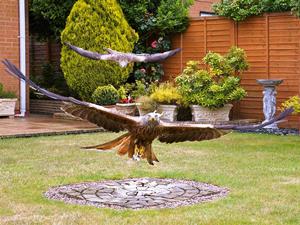'Autumnwatch' red kite scientists seek help with new study
Release Date 05 November 2015

Research from the University of Reading, featured on the BBC's ‘Autumnwatch' last night, shows how a rare bird of prey has made a return to British towns thanks to people feeding them.
Now ecologists have announced plans to follow up on their initial research, with a new study starting in 2016, to see how feeding patterns of the iconic red kite have changed.
In research featured by the BBC Two programme yesterday (4 November) Reading scientists reported that almost one in 20 households around Reading have fed red kites - that's the equivalent of more than 4,300 households in the town.
Now the scientists, led by Professor Mark Fellowes from the University of Reading's School of Biological Sciences, plan to re-investigate how the kites have adapted to being fed by people. They also plan to see how people's attitudes towards red kites have changed now they are more firmly established in the skies above some of Britain's urban areas.
Professor Fellowes said: "Our initial research into red kite feeding began in 2011, when they were still relative newcomers.
"Five years later we hope to find how people's attitudes towards red kites have changed, and to see if more, or fewer, people are feeding them."
With a 1.75m wingspan, red kites were once a common sight over medieval towns in Britain, but after centuries of persecution only a handful of pairs survived by the 1930s.
'Red kites owe both their decline and resurgence to humans, and a little extra human interaction should not do them too much harm, if done sensibly' -- Prof Mark Fellowes
Following a successful reintroduction programme starting in 1989, red kites have enjoyed a resurgence to again become a widespread British bird of prey. There are now thought to be around 2,700 breeding pairs across the country.
While feeding red kites is controversial, and some conservation groups have asked people not to feed them, Professor Fellowes believes people who do feed them choose to do so to get close to this charismatic bird of prey.
"Red kites owe both their decline and resurgence to humans, and a little extra human interaction should not do them too much harm, if done sensibly," he said.
"People regularly feed robins, blue tits and blackbirds in their gardens, and their input is crucial in helping birds to survive the harsher winter months in particular. Red kites may benefit in a similar way."
To register your interest in the new project, email Reading's People and Wildlife research group via paw@reading.ac.uk with your name, address and contact details. The research team will then contact you in the new year with more information on how to be involved in the study.
Anyone in the UK can register their interest. You will only be contacted for the purposes of research into red kites and your details will not be passed to any third parties.
